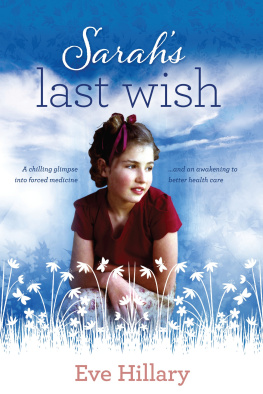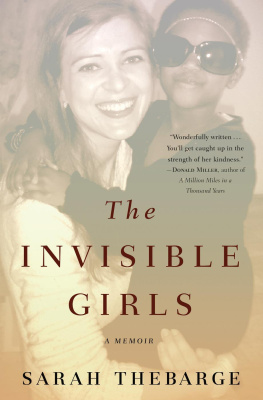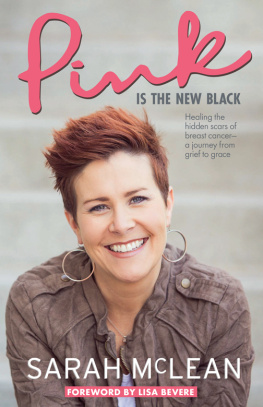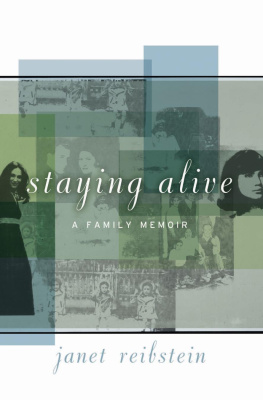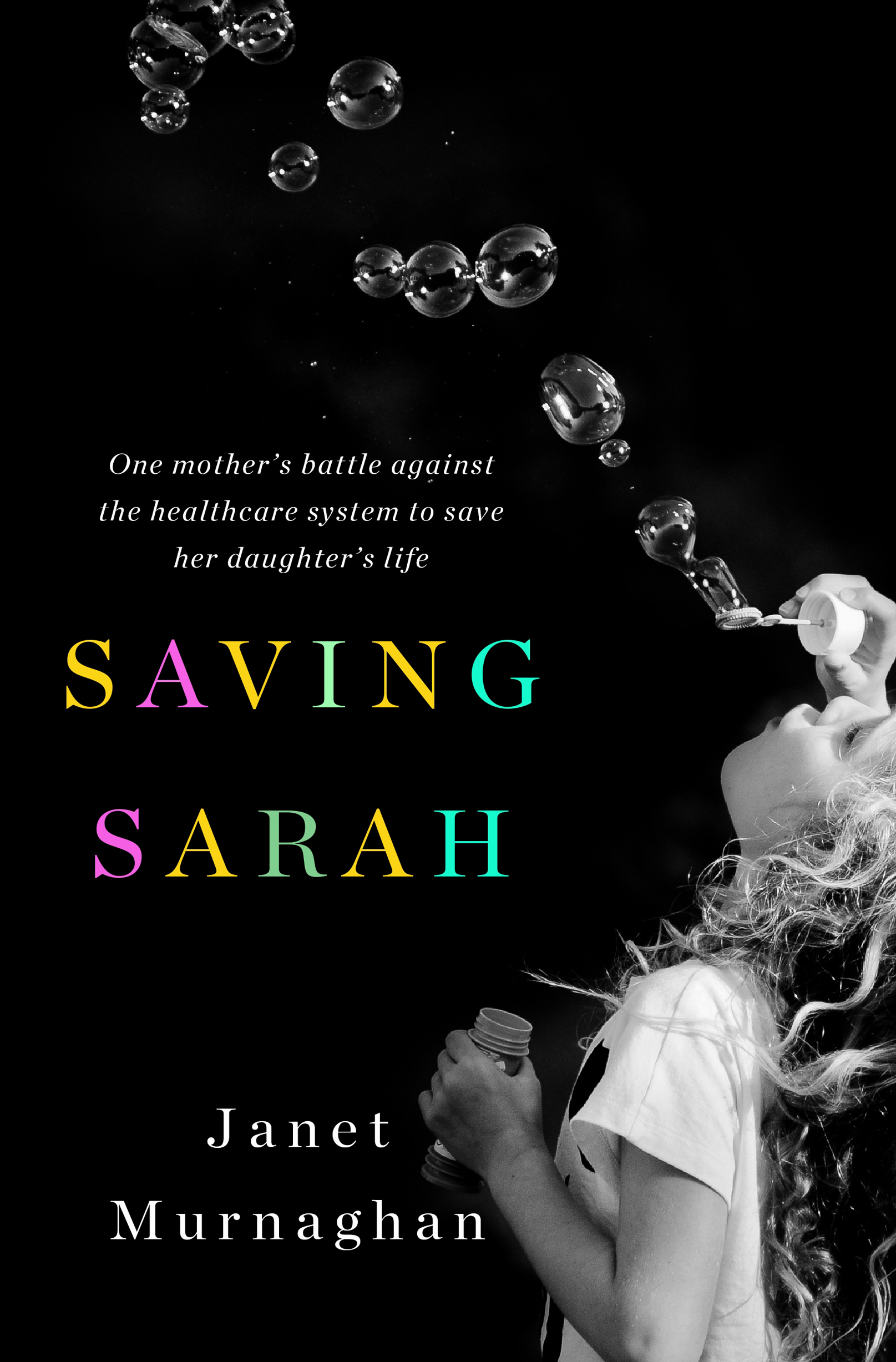Contents
Guide
Pagebreaks of the print version

The author and publisher have provided this e-book to you for your personal use only. You may not make this e-book publicly available in any way. Copyright infringement is against the law. If you believe the copy of this e-book you are reading infringes on the authors copyright, please notify the publisher at: us.macmillanusa.com/piracy.
To the bravest, fiercest, most determined person I know: Sarah. You inspire me every day!
The machines whoosh in a loud, rhythmic pattern as they force air in and out of my babys crippled little lungs. Sarah looks tiny and fragile under the fluorescent lights of the hospital room. She is ten years old but only weighs about fifty pounds and stands the height of a seven-year-old. Her growth has been severely stunted by her long, painful battle with cystic fibrosis (CF)a battle to breathe.
I try to speak, and she struggles to hear me. Sarah has been waiting for a double lung transplant for eighteen months. During that long wait, she has lost more than the pieces of her childhoodher ability to hear has been stripped away, too. The same medication that has kept her death at bay has taken her hearing bit by bit.
I shout so she can hear me over the loud, pulsating machines. Sarah, should we hang all your photos on the door, or do you want some closer to the bed?
Her sweet face, voice, and little smile are engulfed in a mask that encircles her nose and mouth so completely that it is hard to even hear her speak. Mommy, I want some of them closer to the bed this time.
Sarah and I are both trying to focus on decorating her new room instead of on our fear.
Okay, hon, what about the paper lanterns you made? Should we hang them from the ceiling here, too? I am smiling.
Yes, Mommy, I love them.
Sarah and I have a tradition each night as we lie awake in her hospital bed trying to go to sleep; we pretend we are in Hawaii instead of at Childrens Hospital of Philadelphia (CHOP). We run the air-conditioning on high, and the air gently rocks the paper lanterns on her ceiling like an ocean breeze. We then turn on her Twilight Turtle, which is a baby nursery toy. It creates a blue ripple of waves across the ceiling and plays a sweet song. We lie there and talk about our Hawaiian vacation. Neither of us has been to Hawaii, and we are certainly not there now, but we pretend as she drifts off to sleep. Now we hang the lanterns in her new room as we prepare for yet another night of waiting, hoping, and fearing what will happen next.
While I am the cheerleader, the questioner, the emotional one, Fran is steady, dependable, and quiet. He does not wear his emotions on his sleeve like I do, but dont let that fool youhe is breaking to pieces on the inside. Today, Fran is focused on our move from 8-South to the pediatric intensive care unit (PICU). He has taken dozens of trips from one floor to the other. When you have lived in the hospital for three months, changing rooms is like moving a child home from college.
Over the last ten years, Fran and I have created a comfortable rhythm for managing life and family while Sarahs in the hospital. Since her diagnosis at one, shes been inpatient several times a year for a couple of weeks at a time, every single year. Our family has two modes, normal and hospital mode. Typically, we are like any other family, our kids have multiple activities and playdateslifes busy. We shuffle all the usual hubbub of family life around Sarahs medical needs, which include hours of chest physical therapy and multiple medications. We make it work, putting the kids needs first, Fran and I taking whatever is left overwhich, incidentally, is not much. When Sarahs in the hospital, we divide and conquer, which usually means for one, maybe two weeks, Fran handles life at home with our other three kids, while I manage Sarahs care in the hospital. It gives the kids stability, everyone knows what to expect, but its not a very marriage-centered approach. Fran and I live very separate lives during these admissions. I dont micromanage him, and he doesnt micromanage me. I could not care less during hospital mode if the kids at home eat healthfully or their clothes match. Is their hair combed? I dont know and frankly dont care. When Sarahs in the hospital, I let it go; thats his job, hes a great dad, and I dont get involved. Similarly, I handle most decisions at the hospital alone. Before now, its really worked, but this time arounds been harder, longer. I feel lonely and like I am carrying the weight of the world on my shoulders alone here in the hospital. Sarahs never been this sick before.
We fill this PICU roomour new homewith pictures and hang colorful decorations to make it feel homier. Sarahs bed is draped with pink stuffed pigs, and the walls are adorned with her favorite posters from the Twilight movie series.
Sarahs new room is dark and dim; it sits on the interior of the hospital, so there is no natural light at all, just a view of the hospitals atrium. It is depressing.
When you move to a new floor in the hospital, its like being readmitted. A flood of doctors and nurses come in and out asking endless questions. But it is Sarahs team I care aboutthe lung transplant team. They have stood by her since she was listed for transplant almost eighteen months ago. They are professional and kind, but mostly I love them because I can tell that they, too, care about Sarah and are heartbroken to be watching her slip away as we lose this battle. You can see that its personal for them. So, when one of Sarahs transplant doctors enters the room, we are eager to talk to him.
Fran and I are desperate for even a glimmer of hope or good news. We dig for it in our questions, though the answers have been getting gloomier and gloomier. This doctor, James Kreindler, MD, is a particularly pessimistic guy. Dr. Kreindler is a smart man, good at his job, and so caring and sweet with Sarah, but in all situations, he will always be sure to tell me the worst-case scenario. I guess if I were facing reality at this moment, I would say he is a realist. Our reality sucks, and he is brutally honest about that. Perhaps I call him pessimistic to shield myself.
At this point, most of our conversations about Sarah do not happen in front of her, so the three of us step out into the hall. I can feel my hands start to sweat and shake. There is a white-hot knot in my stomach, and we begin todays round of questioning.
My voice trembles as I try to speak. Well, the one good thing, at least, is that her lung allocation score [LAS] is increasing, so even though we are in the intensive care unit, we are getting closer to the call, I say nervously, trying to add my silver lining to our situation while suppressing the tears.
Dr. Kreindlers brow wrinkles with a confused expression, and I think, Oh, geez, here it comes.
He looks at me quizzically. What do you mean?
She is sicker. All her blood work looks worse. So, her LAS score will reflect that, I say defensively.
But Sarahs LAS score doesnt matter because shes under twelve, he declares.
In my mind, I am screaming, What? But I try to muster something more intelligent and articulate than that. Well, I know her LAS does not matter for pediatric lungs, but she is listed for adult lungs now, too, and it matters for adult lungs, I say emphatically.
No, it doesnt matter for adult lungs either since she is under twelve, he says. He is infuriating me. Why, in this moment, is he trying to take away my last hope? And he is wrong. I am certain of it. I refuse to believe him. I want to scream, Stop saying this to me. Stop! You are wrong, so, so wrong! Instead, I say, What are you talking about?


